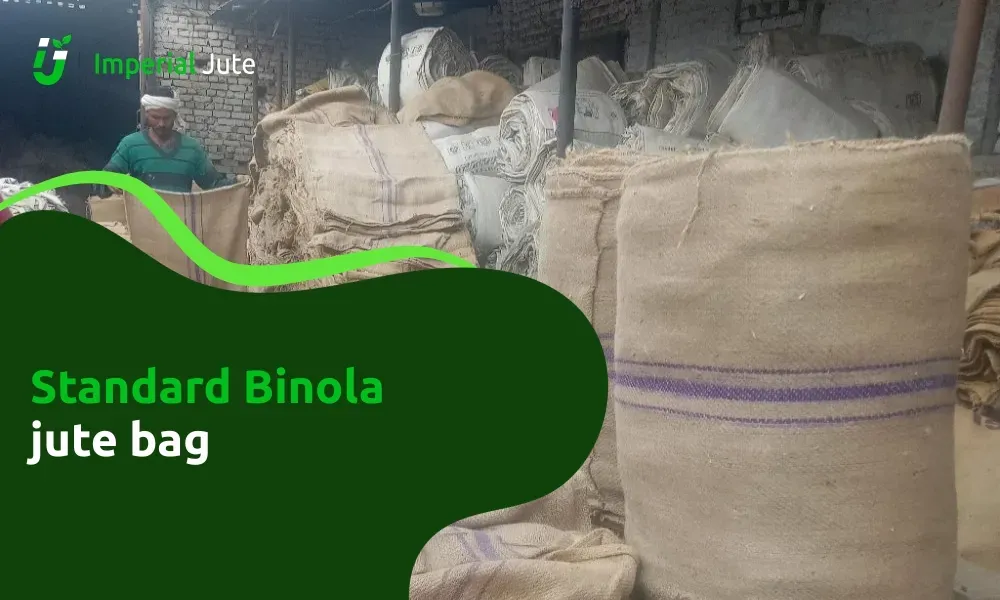Woven jute products have become central to global sustainability efforts, with rising demand across retail, hospitality, and agriculture. As countries enforce plastic bans, biodegradable materials like jute are gaining traction. The European Union, for instance, aims to reduce single-use plastic packaging by 50% by 2030. Bangladesh, the world’s largest jute exporter, offers a robust supply chain for high-volume, customizable jute bags and rugs. These products meet both environmental and functional requirements, making them a preferred choice for international buyers seeking durable, eco-certified alternatives for bulk import and commercial use.
Market Demand & Sustainability Advantage of Woven Jute Products
Woven jute products present a compelling business case, driven by growing global demand for sustainable goods, favorable import margins, and eco-conscious consumer trends.
Global Trends in Jute-Based Products
Jute-based goods are experiencing exponential growth as more industries adopt sustainable supply chains. According to a 2024 report by Research and Markets, the global jute bag market is projected to reach USD 3.1 billion by 2027, driven by increasing restrictions on plastic packaging across Europe, the US, and Asia.
Retailers are shifting to jute tote bags for grocery chains and branded promotions. Interior designers and hospitality brands are also investing in natural woven rugs for eco-conscious hotel aesthetics. This multi-sector demand continues to expand export potential, particularly for manufacturers in Bangladesh, the world’s largest exporter of jute goods.
Why B2B Buyers Are Choosing Jute Over Synthetic Alternatives
Jute bags and rugs offer biodegradable value while maintaining strength and durability. Unlike synthetic products, which can take centuries to degrade, jute decomposes within 1 to 2 years under natural conditions. This environmental edge allows importers to meet both government regulations and consumer expectations.
Moreover, woven jute materials can withstand regular commercial use. For instance, laminated woven jute bags can carry up to 15–20 kg, while jute rugs maintain structure even in high-traffic areas like hotel lobbies.
Industrial and Commercial Applications (Retail, Gifting, Interior, Agriculture)
Woven jute goods cater to a wide variety of B2B verticals. Retailers use printed jute bags for sustainable packaging. Event organizers and corporate brands order them for eco-promotional gifting. Hotels and interior decor suppliers buy jute rugs to add organic aesthetics to modern spaces. Agriculture businesses source jute sacks and floor mats for their natural ventilation and biodegradability.
As a result, these products hold high repeat-purchase potential across seasonal and long-term business needs.
Types of Woven Jute Rugs Offered for Export
Woven jute rugs come in various textures, sizes, and finishes, designed to meet the functional and aesthetic demands of global commercial buyers.
Flat Woven Jute Rug – Affordable and High-Volume
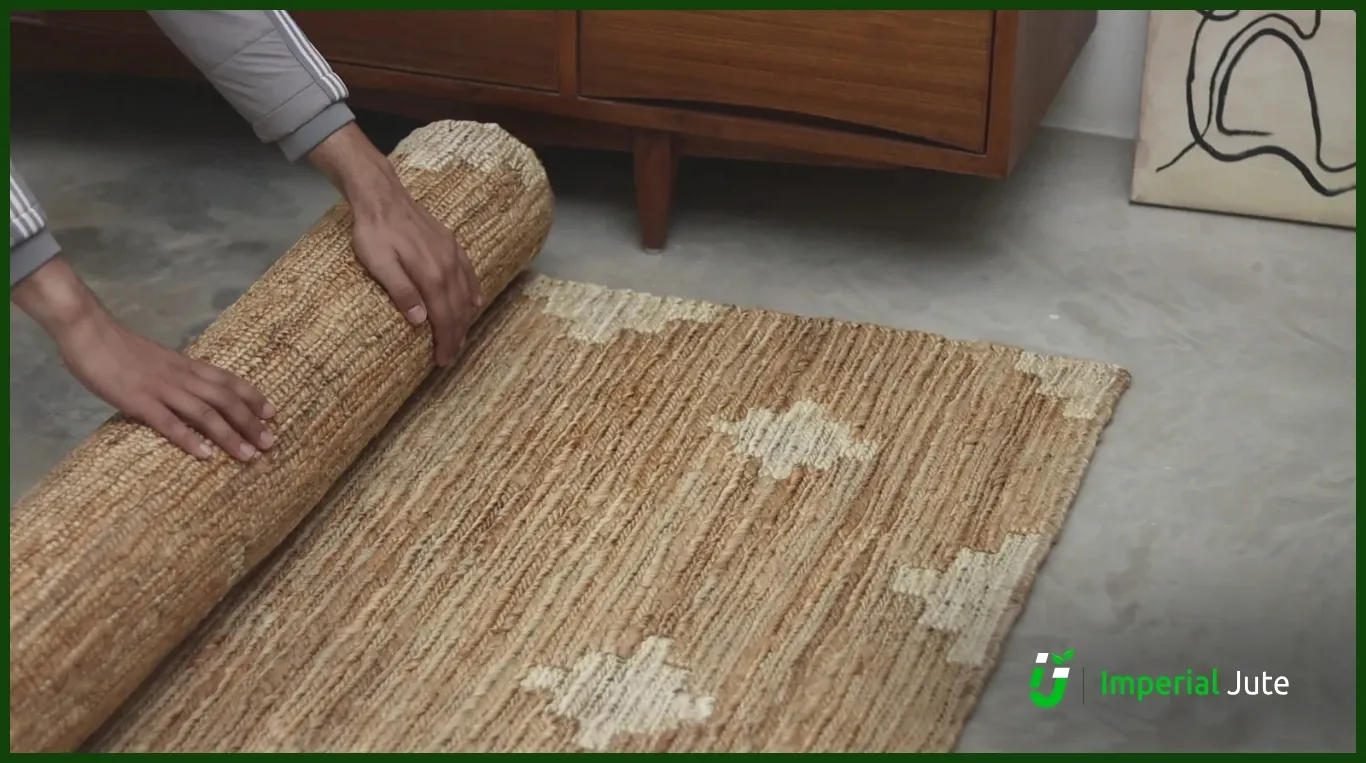
Flat woven jute rugs are thin, flexible, and produced in high volumes—making them ideal for bulk orders. Their minimalist texture and lightweight profile suit online retail and furniture stores. They also ship easily, reducing freight costs for global importers.
These rugs are often used in casual spaces, Airbnb units, and minimalist homes. With common GSM ranges from 180 to 250, they strike a balance between economy and quality.
Hand-Woven Jute Rug – Premium Grade for Luxury Retail
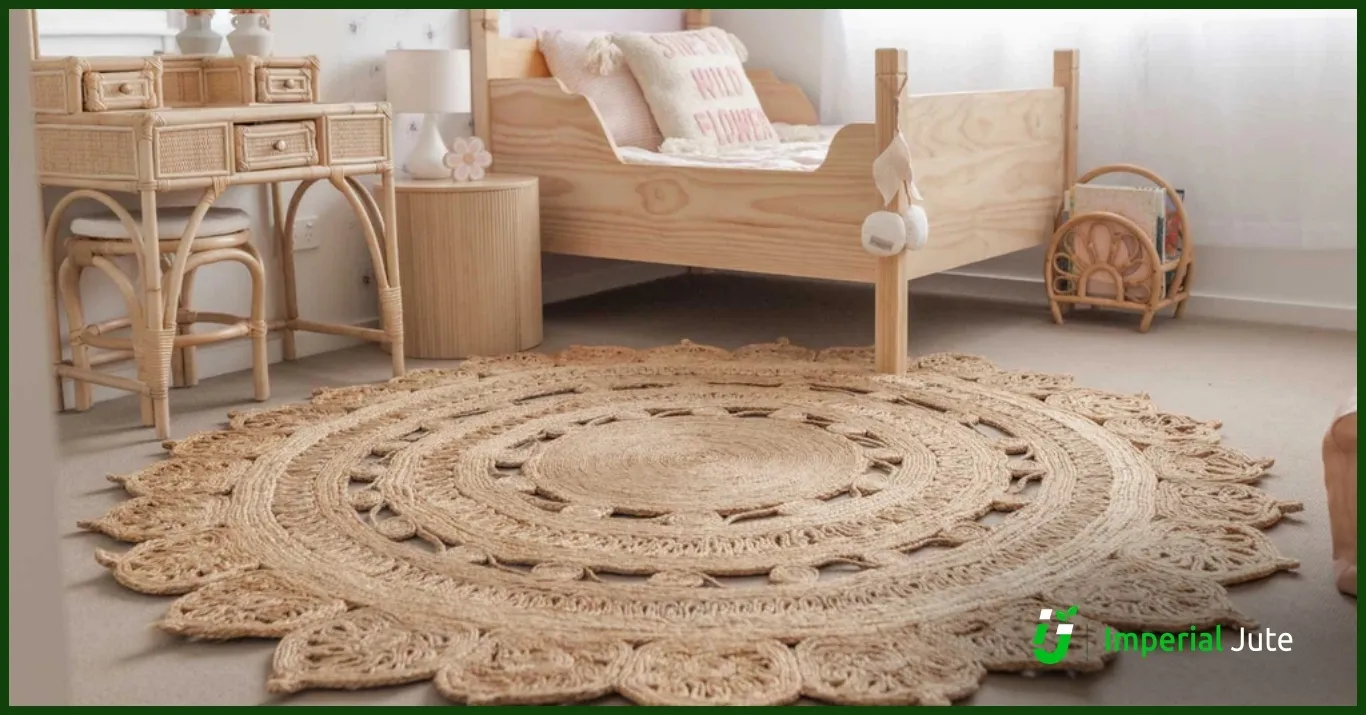
Hand-woven jute rugs appeal to the premium décor market. Each rug showcases artisanal craftsmanship, often featuring braided, looped, or textured weaves. Exporters like Imperial Jute collaborate with skilled artisans to deliver consistent handmade quality at scale.
These rugs are popular in boutique hotels, wellness studios, and luxury home décor stores. With GSM often exceeding 300, they provide plushness and durability that justify premium markups in retail.
Large Woven Jute Rugs – For Hotel Chains, Decor Stores & Interior Projects
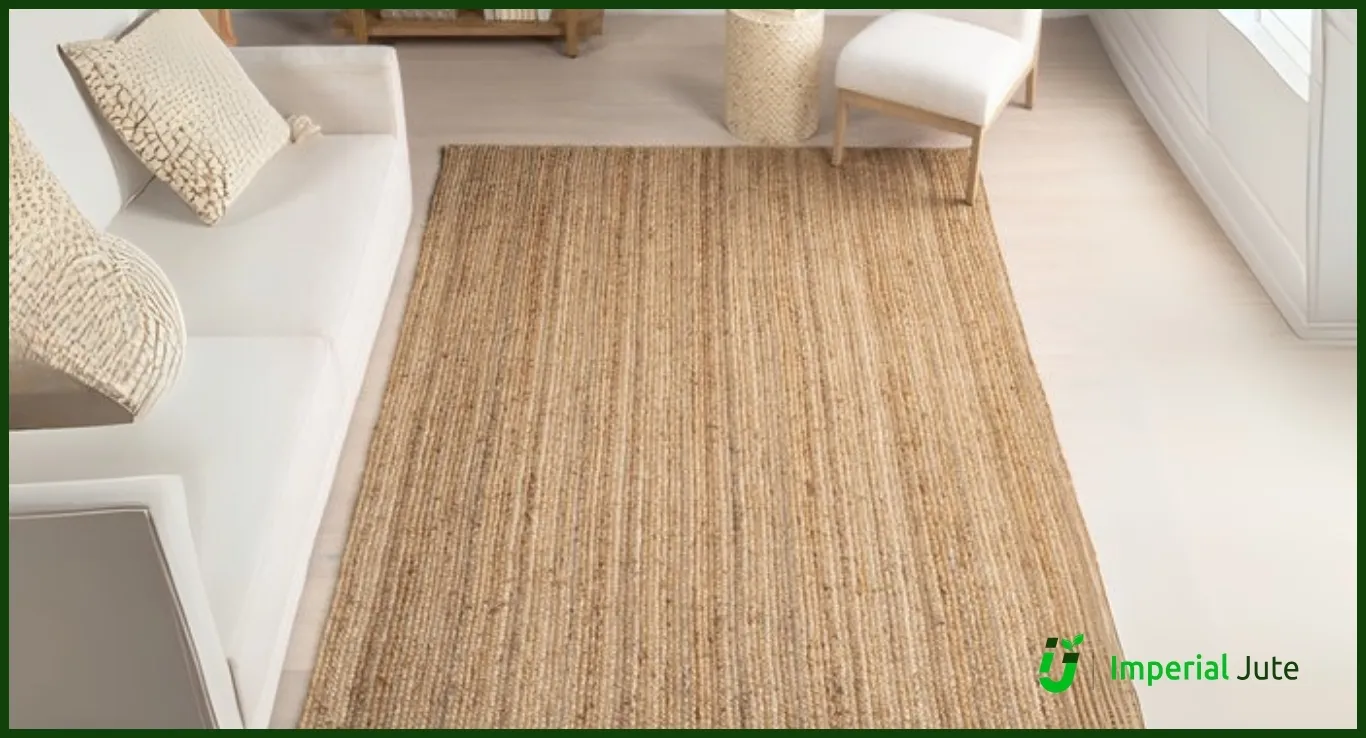
Large-format rugs, such as 6×9 ft, 8×10 ft, or 10×12 ft, are in demand by interior designers and large-scale hospitality projects. They are often used to cover open floor areas, define lounge spaces, or complement wooden interiors.
Importers should consider container load efficiency and moisture-resistant packaging when sourcing these rugs. Imperial Jute offers vacuum-sealed rolls for efficient logistics.
GSM, Size, and Color Customization Options for Rugs
Imperial Jute offers full customization—sizes from 2×3 ft to 12×14 ft, GSM between 180 to 350, and dyeing options in both natural and Pantone-matched colors. Rug borders can be tailored in jute rope, cotton lining, or hemmed edges. Exporters also provide anti-slip latex or felt backings on request, ideal for hospitality clients.
Bulk Woven Jute Bags – Sizes, Finishes, and Custom Branding
Woven jute bags are versatile, customizable, and widely used in retail, corporate gifting, and sustainable packaging markets.
Standard Bag Sizes for Bulk Orders (e.g., 14×16″, 16×20″)
Bulk buyers typically source standard sizes to optimize cost and usability. Common formats include 14×16 inches, 16×20 inches, and 18×22 inches, with gusseted bottoms or flat panels. These dimensions fit most grocery items, promotional goods, and daily-use retail needs.
Imperial Jute provides size charts based on past high-demand exports, helping importers align with regional consumer habits.
Custom Printing – Screen Print, Lamination, Labeling, Pantone Matching
Branding is critical for resale. Exporters offer screen printing with up to 6 colors, lamination for a glossy finish, and inside pocket or zipper integration. Pantone color matching ensures brand consistency, especially for fashion retailers and FMCG companies.
Buyers can also add woven labels, hang tags, or barcode inserts to match local compliance and marketing needs.
Weight Capacity and Stitching Standards
Durability is a major factor in B2B sourcing. Woven jute bags from Imperial Jute can support 10 to 20 kg, depending on the GSM and stitching style. Double-stitched seams and reinforced handles ensure the bags perform under stress.
Strength tests and drop testing reports are provided for corporate clients and retailers with high-load use cases.
Applications – Grocery Retail, Promotional Gifting, Packaging & Exports
These bags are widely used by supermarkets, boutique retailers, trade show exhibitors, and packaging companies. Many buyers use them for holiday campaigns, CSR giveaways, and eco-brand activations. Due to their reusability, one-time events often turn into long-term reorder contracts.
How to Clean and Maintain Woven Jute Rugs in Retail or Commercial Use
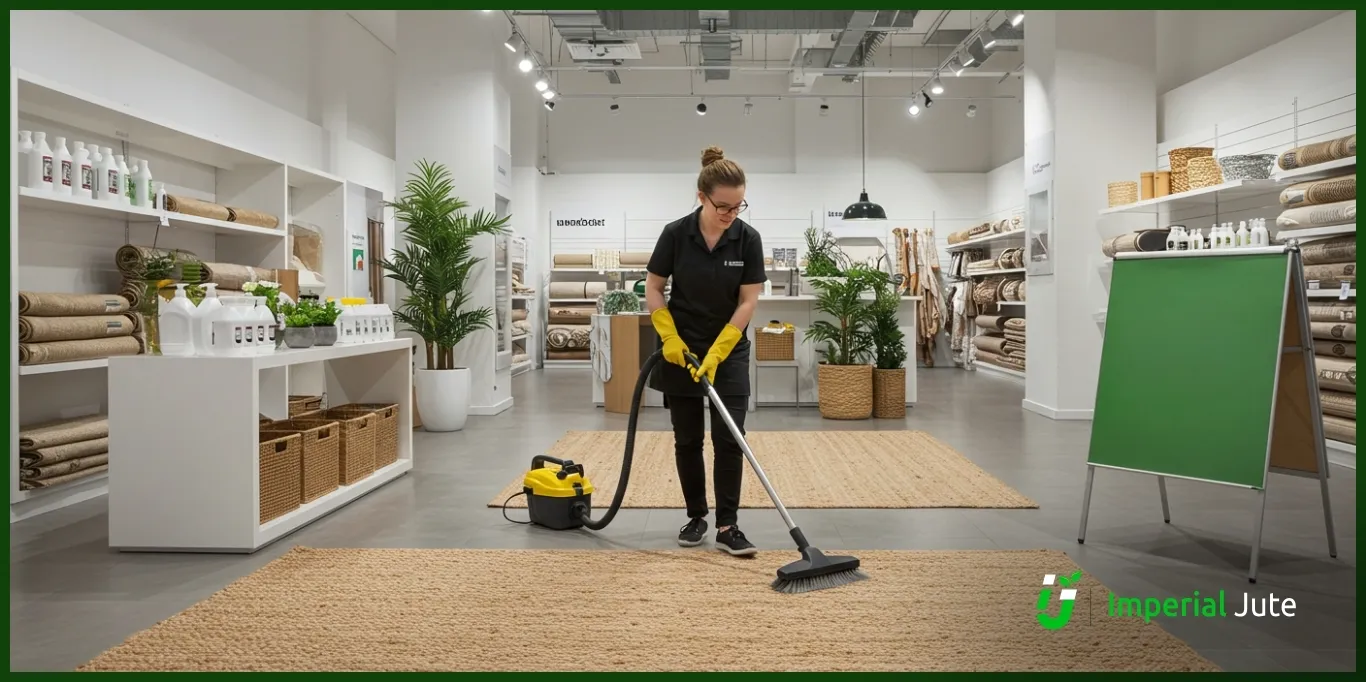
Proper care extends the life of jute rugs, minimizes customer complaints, and boosts satisfaction in retail and hospitality sectors.
Vacuuming, Spot-Cleaning, and Stain Removal for Jute Rugs
Regular vacuuming with a brushless head helps prevent fiber shedding. For stains, blotting with diluted vinegar or mild soap works well without damaging fibers. Avoid scrubbing, as it weakens the weave.
Retailers often provide QR code care guides to educate end users and reduce return rates.
Storage and Moisture Protection in Warehouses
Jute is sensitive to moisture. Rugs should be stored in well-ventilated, dry environments. Wrapping with breathable fabric or storing on pallets avoids fungal growth. For long-term storage, silica gel packets or dehumidifiers help preserve quality.
Importers handling warehouse stock should ensure that rotation practices are in place to avoid rug curl or fiber compression.
Cleaning Guidelines for Hospitality and Decor Clients
Hotels and spas using jute rugs must follow low-moisture cleaning methods. Dry shampooing and spot steaming with handheld devices are recommended. Avoid full submersion cleaning as it can distort shape and color.
Imperial Jute provides cleaning instruction cards with every shipment for high-volume buyers in decor and hospitality.
How to Source Woven Jute Bags & Rugs from Bangladesh – Step by Step
A clear and well-documented sourcing process makes it easier for importers to place confident, bulk orders while minimizing risks and delays.
Sample Request and MOQ Details
Imperial Jute offers free or paid samples, depending on the product type and order volume. Most export-grade samples are sent via DHL or FedEx within 5–7 business days. Minimum order quantities (MOQ) typically start from 500–1,000 pieces for bags and 50–100 units for rugs.
Buyers can request custom samples with printing or size changes for validation before confirming bulk production.
Lead Time, Production Schedule, and Port Information
Lead times range from 2 to 6 weeks, depending on the order size and customization requirements. Standard products from stock can be dispatched in 7–10 days. All goods are shipped via Chattogram Port, the largest seaport in Bangladesh, which has efficient access to maritime routes to the Middle East, EU, and North America.
Buyers are regularly updated on production milestones, including raw material processing, weaving, finishing, printing, and final inspection.
Pricing Models – FOB, CNF, CIF
Pricing models are flexible to suit different import policies. Imperial Jute supports:
- FOB (Free on Board) – ideal for buyers with their own freight forwarders
- CNF (Cost & Freight) – cost-effective for bulk shipments to major ports
- CIF (Cost, Insurance, Freight) – ensures end-to-end coverage for new importers
Price quotes include packaging, documentation, and clearance fees. Volume-based discounts are also available.
Private Label and White-Label Partnerships
B2B buyers can opt for private-label production with full branding or white-label sourcing for resale under their own name. Imperial Jute offers NDA-based white labeling for businesses wanting exclusive product lines without revealing the source.
Services include custom woven labels, branded inserts, and barcode-ready retail packaging for direct-to-store delivery.
Why Imperial Jute? Trusted Manufacturer & Exporter in Bangladesh
Imperial Jute stands out as a preferred sourcing partner for woven jute bags and rugs due to its reliable manufacturing, global logistics, and customer-focused service.
Production Capacity and Factory Capabilities
Imperial Jute operates with a daily production capacity of 15,000+ bags and 500+ rugs, powered by advanced looms and semi-automatic finishing units. The factory employs skilled artisans, compliance officers, and QA professionals who oversee each production batch.
Custom projects are supported by an in-house design team that helps buyers with pattern adjustments, artwork layouts, and packaging design.
Export Footprint – 20+ Countries
The company exports to over 20 countries, including the USA, Germany, UAE, Japan, Ghana, Saudi Arabia, and Australia. Buyers range from supermarkets and decor stores to governments and NGOs sourcing eco-packaging for CSR programs.
Imperial Jute’s experience in handling global compliance, language-specific labeling, and port documentation ensures smooth customs clearance in most regions.
Client Testimonials and Repeat Order Rate
Over 65% of buyers place repeat orders thanks to consistent product quality, clear communication, and timely delivery. Testimonials from buyers highlight Imperial Jute’s flexibility in handling urgent shipments, transparency in pricing, and commitment to sustainable sourcing.
Buyers also appreciate the proactive support during pre-shipment inspections, lab certifications, and freight bookings.
FAQs for Importers of Woven Jute Bags and Rugs
This section addresses common questions international buyers ask before placing orders for jute products.
Are woven jute bags biodegradable and plastic-free?
Woven jute bags are biodegradable and plastic-free. Jute is a natural plant fiber that decomposes within 1 to 2 years in composting conditions. These bags contain no synthetic plastics, making them an eco-friendly alternative to plastic bags for shopping and packaging.
Can I get fully custom-sized bags or rugs?
You can get fully custom-sized bags or rugs from most jute and textile manufacturers. These companies allow you to specify exact dimensions, materials, and design features to meet your needs. Customization is common in bulk orders and supports retail, packaging, and home décor use.
What’s the typical delivery time for bulk orders?
The typical delivery time for bulk orders ranges from 3 to 6 weeks. Delivery time depends on order size, customization requirements, and shipping location. Local orders may arrive faster, while international shipments may take longer due to logistics and customs clearance.
Do you support third-party inspections or audits?
Most manufacturers support third-party inspections or audits. These inspections ensure product quality, ethical labor practices, and compliance with international standards. Buyers can arrange for independent auditors to visit the facility before, during, or after production.
